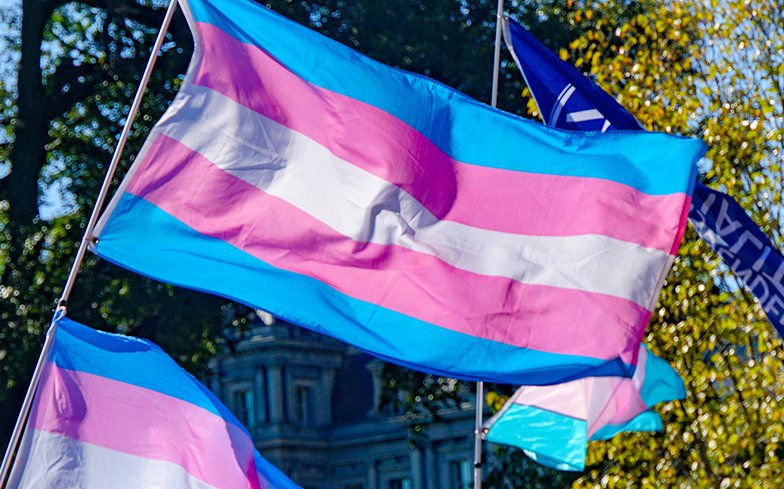Questioning transphobia
Rich, white, skinny, pretty. Boy or girl, popular or not. We as humans like to put people in boxes, classify them as option a or option b. If you don’t fit into a box, you’re either seen as unique or a misfit, and there’s often no in between.
When it comes to people who don’t fit strictly into the boy or girl box, it can be slightly hard to fit in. Joe Quinn, sophomore who identifies as non-binary, has found that when they share how they identify, there’s either those who are accepting or those who are not.
“Sometimes telling anyone in general is an inconvenience for them, when in reality, it’s not,” said Quinn.
There’s those who are accepting, and those who are not. Junior Nova Emely tried answering this question.
“I think it’s mostly stereotypes or misinformation that cause people to be transphobic,” Emely said. “I think that parental beliefs also influence it. If people would educate themselves independently, they would see we’re not much different than everyone else.”
Another student, who has chosen to remain anonymous, saw a different perspective.
“I don’t know if it’s jealousy, or maybe some people just don’t feel like they’re themselves when they see other people being themselves, but I feel like transphobia comes from a place of low self-esteem and fear,” the student said. “We’re not forcing ourselves to be the opposite gender, we’re just trying to be who we are. I’ve found that a lot of people don’t like it when someone is their true, authentic self.”
There’s transphobia constantly in the media and government, such as laws that prevent trans woman athletes from being on women’s sports teams. Transphobia is rooted in jobs, where people get denied a position because of the way they identify. It’s rooted in society when people refuse to use desired pronouns or names. It’s rooted in religion, as shown when certain religious beliefs refuse to accept trans people. It’s everywhere, all around us, and has even taken place in schools.
A national survey by GLSEN has found that 75% of transgender youth feel unsafe at school, and those who are able to persevere had significantly lower GPAs, were more likely to miss school out of concern for their safety, and were less likely to plan on continuing their education.
Students say dozens of incidents have occured, but the question is, why hasn’t the school done anything about it? The answer to that is that they often don’t know about it.
Students are often too afraid to go down to the office to report someone for fear that they’ll get in trouble or that the incident, despite it being bullying, was insignificant enough that it doesn’t matter.
Assistant principal Mrs.Tanya Pickett, said that when kids come down to report incidents, they get taken care of, no matter who the perpetrator is.
“At Carroll, we don’t believe in harassment. We don’t believe in discriminating against people or anything like that,” Pickett said. “If that is going on, we are going to take steps to resolve that. Public education means freedom from being harassed. Everybody gets those same opportunities; it just depends on who takes advantage of that.”
The school has rules, but that still doesn’t eliminate the issue that remains. No amount of Pride display cases and supporting LGBTQ+ students can overcome much of the pain of transphobia.
However, it’s not possible to get rid of all the pain in the world with a snap of the fingers. If it was, it would have been done by now.
“Not wanting to learn or change the way you think or having the ignorance of how this community feels and why we’re so tired of the refusal to accept these uncontrollable differences, plays a big role in the phobic practices of some people,” said Junior Reese Wilkins, who is a part of the LGBTQIA+ community.
The recent legislative bills that have been passed, such the Parental Rights In Education bill in Flordia, which was dubbed the Don’t Say Gay bill, and the multiple laws regarding whether or not transgender athletes are allowed in school sports, which has been passed in 10 states. Indiana is one of those states, and passed the Indiana House Bill 1041 about participation in school sports.
The attempts to stop children from learning about LGBTQIA+ topics, and stop transgender students from participating in sports teams that reflect their gender identity makes it harder for students to learn about themselves and feel not discriminated against.
“I wish so much that I had received education about this in school because going through that questioning and unsureness is a terrible time of feeling lost and unaccepted and so far from your own self-identity. Claiming to care so much about a child and then not giving them the resources to make themselves feel whole and comfortable is so hypocritical in my mind,” said Wilkins.
With the way things are right now, is there even a way to fix everything?
“More listening and less talking could do people some good. It really is so easy to just listen and ask respectful questions and become educated about the feelings of other people. Conversations about topics like transphobia are important to have, but the reluctance to change old ways of thinking is so strong in so many people,” said Wilkins.
Wilkins offers this advice.
“I think it would be easier and so much more relaxing for everybody if we stopped being so hateful. Being hateful takes so much energy and trying to reason with people who are hateful takes just as much if not more energy.”

Hi, my name is Jack, and I'm a senior. I'm a writer on the Charger Online, a songwriter, and a person who's too fruity for homophobes to handle. I'm also...



